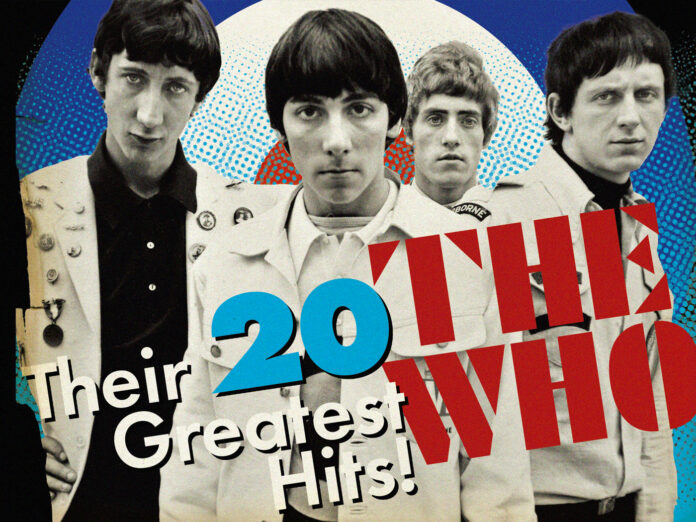Pinball Wizard (Townshend)
Producer: Kit Lambert
B-side: Dogs Part 2 (Moon, Towser, Jason)
Released: March 1969
Highest UK chart position: 4
As undisputed rock classics go, the premise for this – The Who’s most celebrated anthem bar “My Generation” – is as unorthodox as it gets: an awestruck, third-person account of a blind, deaf mute and his remarkable proficiency at bagatelle.
Despite protestations from those such as Radio 1’s Tony Blackburn that the disc was “sick”, “Pinball Wizard” was still the most accessible offering from the admittedly convoluted narrative of Tommy, 1969’s double-length ‘rock opera’ with which they would become forever synonymous. That the song returned The Who to the UK Top 10 probably said less for its illogical lyrics than it did the momentum provided by Townshend’s fluttering acoustic rhythm track and its volcanic intro – often imitated but never bettered.
While Townshend professed to seeking musical inspiration from the likes of Henry Purcell, the introduction of pinball itself into Tommy’s plot was even more contrived – to guarantee that friend of the band/New York Times critic Nik Cohn, himself a pinball freak who was extremely distrustful of the ‘rock opera’ concept, gave the album a rave review.
Whatever the intention, the plan worked. It was in America, rather than at home, that Tommy really struck gold. Had it not, The Who would almost certainly have been finished, since its success saved the band from financial ruin after years accruing crippling debts by the systematic destruction of hire-purchase equipment in the name of showmanship.
Yet Tommy was to change more than just their bank balances. “Pinball Wizard” marked the beginning of the end of The Who as a singles machine as Townshend eschewed the immediacy of their ’60s legacy for works increasingly epic in both lyrical scope and musical arrangement. At the same time, Daltrey’s discovery of his true singing voice as the eponymous deaf, dumb and blind messiah set a lung-busting precedent for the heaviness to come.
Similarly, Entwistle and Moon’s onstage transformation of the album’s 70-minute song cycle into a roof-raiser helped earn their reputation as the greatest live act on the planet as the ’70s dawned. Their days as a pop group now over, rock superstardom, and attendant ills, beckoned.
Daltrey: “Kit’s production on ‘Pinball Wizard’ is absolutely tremendous. The whole montage of sounds he got in emulating the pinball machine is extraordinary. I don’t think he got enough recognition for his work on that. Not necessarily the sound he got – because most of the time making Tommy we were out of our boxes, God knows what we were doing – but the actual arrangements and the ideas, the harmonies and the structures.”
________________________
The Seeker (Townshend)
Producer: Kit Lambert
B-side: Here For More (Daltrey)
Released: March 1970
Highest UK chart position: 19
For all its success, Tommy also brought its fair share of misery for The Who, threatening to engulf the band completely as they accrued a new ‘snob rock’ audience (becoming, as Entwistle groused, “the kind of band that Jackie Onassis would come and see”).
As their first single of the ’70s, “The Seeker” seemed a reactionary attempt to return to their earnest roots of rock without opera. Its confident, three-chord rhythm riff was indeed classic Townshend, but not so the lyrics; a dated quest for enlightenment name-checking The Beatles, Dylan and Timothy Leary. Far from a brand new start, “The Seeker” sounded like a requiem for the previous decade, marred by a muted Moon performance.
The drummer’s lack of enthusiasm was to be expected, though it was for far graver reasons than apathy towards the music. Barely a fortnight before its recording in January 1970, Moon had been invited to open a nightclub in Hatfield, Hertfordshire – an evening that was to end in tragedy. Upon leaving the venue, Moon and his party were attacked by a gang of skinheads as they prepared to drive off in their Bentley. Moon’s chauffeur, Cornelius ‘Neil’ Boland, stepped out of the car to fend them off. During the ensuing scuffle, Moon panicked and drove the car forward, unaware that Boland had been knocked to the ground by the mob. Crushed beneath its wheels, Boland was pronounced dead on arrival at a nearby hospital within the hour. Though vindicated by the police enquiry, Moon’s guilt over his friend’s death would torment him till his own untimely passing eight years later.
Daltrey: “I was never ever fond of ‘The Seeker’. To sing that song, to me, was like trying to push an elephant up the stairs. I found it cumbersome, the first song we’d ever done where I thought, ‘Nah, this is pretentious.’ I haven’t heard it for so long that, to be honest, I couldn’t even tell you what it sounds like.”



